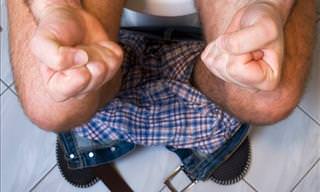Did you know that there are carcinogens lurking throughout your home? From the couch you watch TV on, to curtains, carpets, and even your food, there are many domestic cancer hazards that you need to be aware of in order to stay healthy. Learn all you need to know right here:
1. Couch

Many couches, mattresses and other pieces of cushioned furniture are treated with a flame retardant that’s carcinogenic. TDCIPP was used so prevalently prior to 2013 that a Duke University study found it to be in the bloodstreams of all the participants it tested. That’s why you should consider replacing any cushioned furniture that you purchased prior to 2013, and check labels on any new purchases you’re considering.
2. Curtains and Carpets
If you happen to be a smoker and smoke indoors, you should know that you’re likely to have cadmium present in your home’s curtains and carpets. Cadmium is a carcinogenic byproduct of cigarette smoke that embeds itself into fabric that you just end up breathing in once again. The way around this is simple – just quit smoking!
3. Leather Recliner

Chromium, another carcinogen, is used in tanning and dying processes for leather, wood furniture, and textiles. A Danish study found that almost half of all the leather shoes imported into the country contained a quantity of Chromium VI. To avoid this carcinogen, make sure you pay attention to labeling.
4. Garden
Dioxin is a carcinogen that forms as a chemical byproduct and ends up in soil and water. It can be found in dust on shelves, dirt on floors and residue on vegetables. You can avoid it by wearing gloves when working in the garden. In addition, you should avoid burning household trash in your backyard.
5. An Old Fridge

Polychlorinated Biphenyls, which are now banned in the US, are present in old appliances, fluorescent lighting fixtures, and electrical transformers. PCBs are still used in developing countries, and some 70% of them end up in the environment. If you have old appliances, get rid of them, and replace any fluorescent light fixtures in your home.
6. Cleaning Products
Most domestic cleaning products contain some form of formaldehyde, which is a carcinogen that’s also found in cosmetics, some types of convenience foods, paint, foam insulation and permanent press fabrics. Although it seems almost impossible to avoid, you can reduce your potential exposure to formaldehyde by choosing the cleaning products you buy very carefully, and making sure that cooking areas are well-ventilated.
7. Closets

There’s a chemical used in dry-cleaning that’s called perchloroethylene, which is a carcinogen that can build up in places where you store your dry-cleaned clothes. It can also be found in spot removers, shoe polish and wood cleaners. Minimize your exposure to it by wearing gloves when you’re polishing shoes, and if you get your clothes dry-cleaned, try to find a dry-cleaner that doesn’t use perchloroethylene.
8. Vinyl Flooring and Miniblinds
Phthalates are found in vinyl flooring, shower curtains, synthetic leather, miniblinds and anything made with PVC vinyl. They’re also found in food packaged in plastic. Look for products that are labeled phthalate-free and get rid of any of your children’s plastic toys that date back to before 2008.
9. Chicken and Rice Dinner

It’s common knowledge that arsenic can be lethal, but in smaller doses, it can be carcinogenic. It can sometimes be found in foods such as chicken, rice and fruit juices. It’s also present in degreasing products, dyes, furniture wax, glues, lubricants, nylon, and paints. Try serving only organic chicken at home, and familiarize yourself with rice-related guidelines as issued by Consumer Reports. Also always check the label on the household products you buy.
10. Insulation
Asbestos has been frowned upon for decades, but you can still find it lurking in the insulation of older homes. As the insulation deteriorates, asbestos fibers become airborne, sticking to clothing and shoes.
 Go to BabaMail
Go to BabaMail


























































